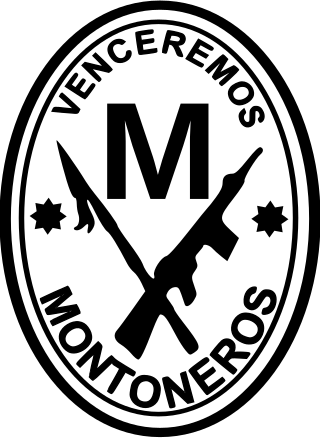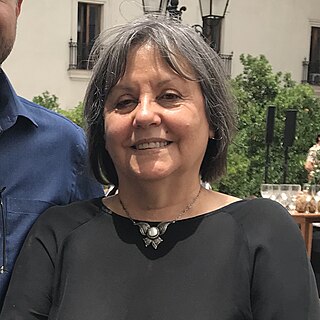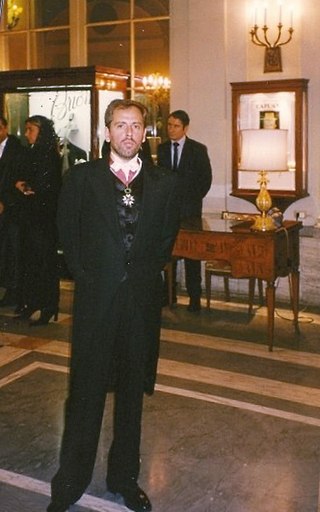
Montoneros was an Argentine far-left Peronist and Catholic revolutionary guerrilla organization, which emerged in the 1970s during the "Argentine Revolution" dictatorship. Its name was a reference to the 19th-century cavalry militias called Montoneras, which fought for the Federalist Party in the Argentine civil wars. Radicalized by the political repression of anti-Peronist regimes, the influence of Cuban Revolution and socialist worker-priests committed to liberation theology, the Montoneros emerged from the 1960s Catholic revolutionary guerilla Comando Camilo Torres as a "national liberation movement", and became a convergence of revolutionary Peronism, Guevarism, and the revolutionary Catholicism of Juan García Elorrio shaped by Camilism. They fought for the return of Juan Perón to Argentina and the establishment of "Christian national socialism", based on 'indigenous' Argentinian and Catholic socialism, seen as the ultimate conclusion of Peronist doctrine.

Diamela Eltit is a Chilean writer and university professor. She is a recipient of the National Prize for Literature.

Juan Gelman was an Argentine poet. He published more than twenty books of poetry between 1956 and his death in early 2014. He was a naturalized citizen of Mexico, country where he arrived as a political exile of the Process, the military junta ruling Argentinia from 1976 to 1983.
The Night of the Pencils, was a series of kidnappings and forced disappearances, followed by the torture, rape, and murder of 10 high-school students that began on the evening of 16 September 1976 and continued into the next day, during Argentina's last civil-military dictatorship. The event is one of the most infamous acts of repression committed by the last Argentine military dictatorship, as most of the victims were under 18 years of age. Four of the victims survived; the remains of the others have never been found.

Olga Zubarry was an Argentine actress who appeared in film between 1943 and 1997. She made over 60 appearances in film, spanning six decades of Argentine cinema, but is best known for her work during the Golden Age of Argentine Cinema. Throughout the course of her career, she received four Silver Condor Awards, two Martín Fierro Awards, a Konex Foundation Award and several others for her films and television performances. She is credited with starring in the first film in Argentina which featured nudity, though only her back was shown and she stated repeatedly that she wore a flesh-colored mesh and was not truly nude.

Alberto Vanasco was an Argentine novelist, poet and short fiction writer.
Juan Carlos Portantiero was an Argentine sociologist.
David Kraiselburd (1912–1974) was an Argentine journalist, newspaper publisher, and lawyer, best known for his commitment and actions against military regimes and political violence of both right- and left-wing extraction. He was assassinated shortly after the beginning of the Dirty War—in mid-1974—and shortly before the military coup.

Patricia Bullrich is an Argentine professor and politician who was appointed Minister of Security in 2023 under president Javier Milei, having previously held the office under president Mauricio Macri from 2015 to 2019. She was the chairwoman of Republican Proposal, until 2024.

Daniel Esteban Herrendorf is an Argentine writer, essayist and philosopher.

Juan Manuel Abal Medina is an Argentine academic, political scientist, and author. He was appointed Communications Secretary by President Cristina Fernández de Kirchner in 2011, and served as Chief of the Cabinet of Ministers of Argentina from December 2011 to November 2013. He was a national senator for Buenos Aires Province from 2014 to 2017.
Alberto Manuel Campos (1919–1975) was an Argentine politician and member of the Peronist Party. He was born in José León Suárez, Buenos Aires and was assassinated on December 17, 1975.

Sara Facio was an Argentine photojournalist and publisher. She was best known for having photographed, along with Alicia D'Amico, various cultural personalities, including Argentine writers Julio Cortázar, María Elena Walsh and Alejandra Pizarnik. She co-founded the publishing house "La Azotea" alongside María Cristina Orive in 1973.

The Frente Renovador (FR) is an Argentine Peronist political party. The party is a member of the big tent political coalition Union for the Homeland. In 2019 the party was legally recognized after obtaining definitive legal status in the electoral districts of Buenos Aires Province, Autonomous City of Buenos Aires, Santa Cruz, Tucumán, Santiago del Estero, Santa Fe, La Pampa and Chubut.

Andrea Graciela Giunta is an Argentine art historian, professor, researcher, and curator.

Eduardo Enrique "Wado" de Pedro is an Argentine lawyer and Justicialist Party politician who has served as National Senator since 2023. He previously served as the country's Minister of the Interior from 2019 to 2023, National Deputy for Buenos Aires Province, as member of the Council of Magistracy, and General Secretary to President Cristina Fernández de Kirchner.
The 2020 COVID-19 pandemic in Argentina affected the human rights situation in the country.
Tamara Kamenszain was an Argentine poet and essayist.

Eduardo Héctor Garat Cabanillas was an Argentine lawyer and notary and a Montoneros militant.

Ana Amado was an Argentine journalist, filmmaker, academic and feminist. In Mexico while in exile, she produced films under the name Cristina Benítez. Amado grew up in rural Argentina and, after training to be a teacher, earned a degree in political science from the Catholic University of Santiago del Estero. During her schooling, she began to work as a television news producer and print journalist. Orphaned when she was young, she moved to Buenos Aires after her graduation and worked for several different television news stations. Traveling abroad with her job, she interviewed subjects like Fidel Castro and Muammar Gaddafi. Because of her support for the leftist Montoneros radicals, she became a target of the Triple A terrorist squads in 1974. Her boyfriend Nicolás Casullo was also targeted, causing the couple to marry and go into exile.














